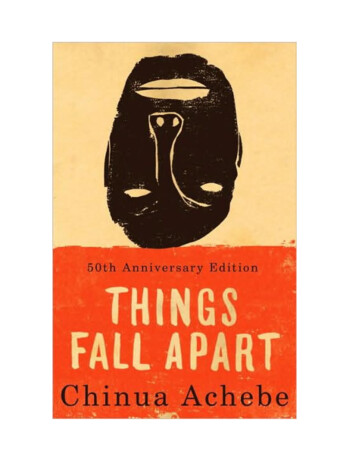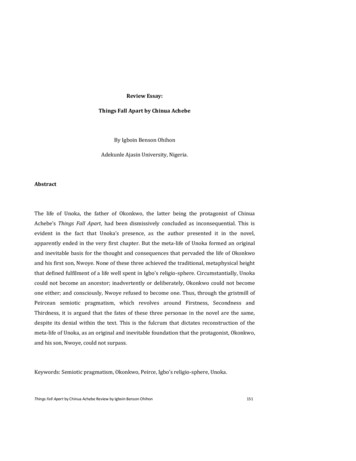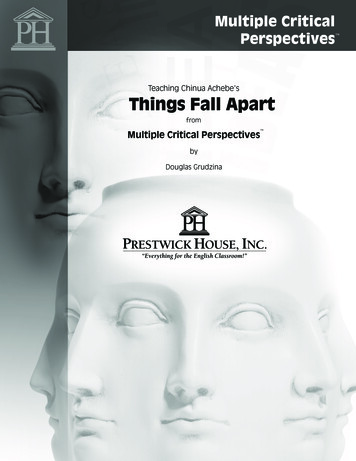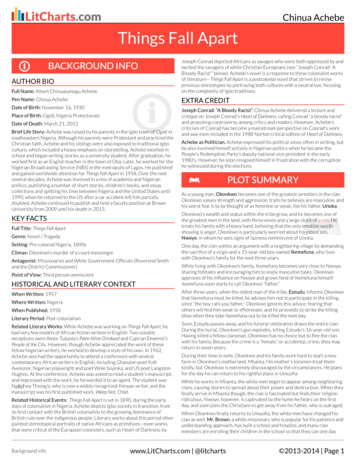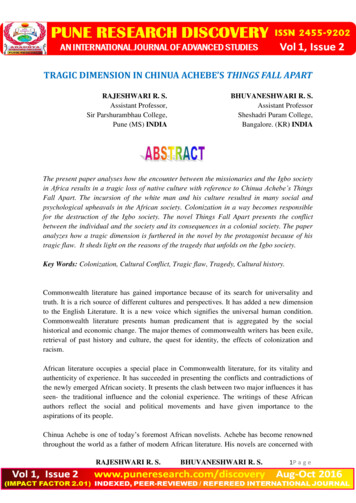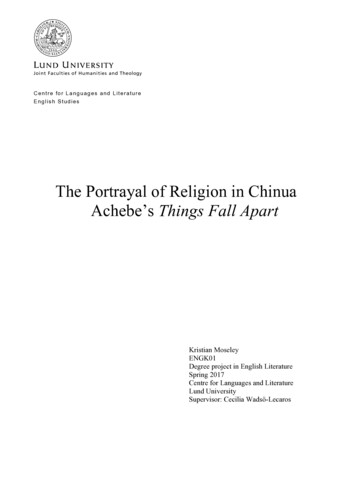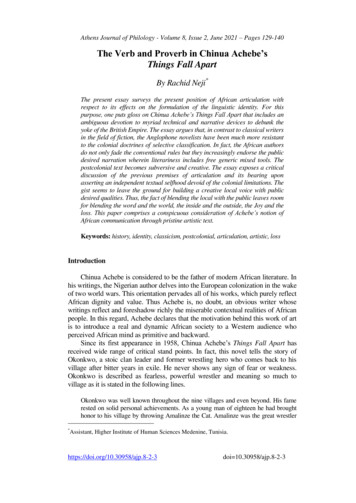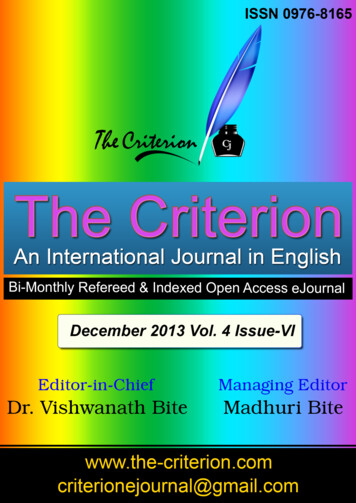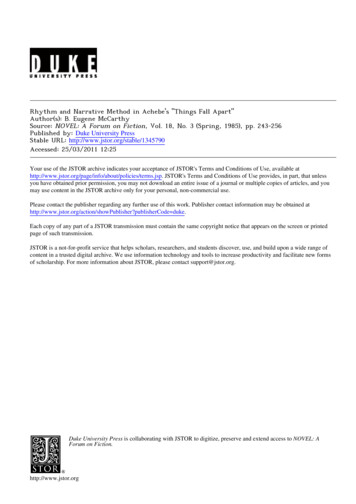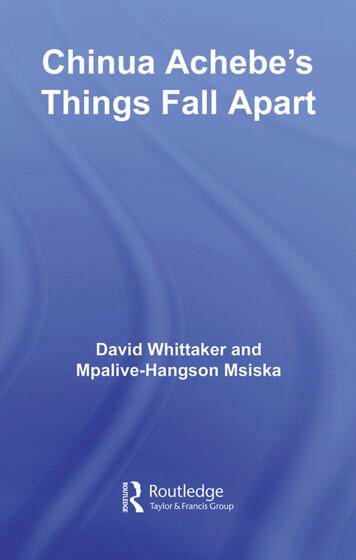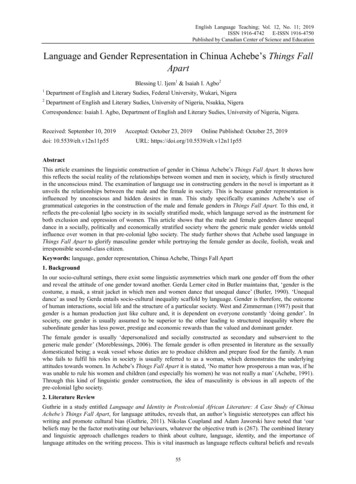
Transcription
Annals of Language and LiteratureVolume 3, Issue 2, 2019, PP 26-38ISSN 2637-5869Chinua Achebe’s Things Fall Apart and Anthills of theSavannah and Postcolonial AuthenticityAmechi N. Akwanya*Department of English and Literary Studies, University of Nigeria, Nsukka, Nigeria*Corresponding Author: Amechi N. Akwanya, Department of English and Literary Studies,University of Nigeria, Nsukka, Nigeria, Email: amechi.akwanya@unn.edu.ngABSTRACTAuthenticity is raised by Sartre as a fundamental issue in human existence. It becomes greatly complicatedfor human existence under colonialism, a situation which is not automatically remedied by politicalindependence. Countries that have passed through colonial tutelage typically have a double inheritance:the cultural tradition which predated colonization and persisted alongside colonialism as the latter wassetting up a formal sector aligned to its own interests, and the value system of the colonizing power whichbecomes diffused in a variety of ways within the indigenous group. Hybridity is one of the consequences ofthis dual heritage, creating uncertainty as to where and how to ascertain authenticity among the subjects.In Chinua Achebe’s Things fall apart and Anthills of the savannah, colonialism yields characters whoaffiliate to the outsider, as they see in the newcomers an access route to power. It also unveils subjects whocling to the cultural tradition and become definable by opposition to the newcomer. There are others whomay be said to be in the middle, effectively rendered rootless by colonialism. It is shown in this paper thatthe possibility of a synthesis and formation of a new and autonomous identity is expressed within this lastgroup, since they are much more willing to take whatever they need from any source for the formation ofthis new identity. For these authenticity is evolving and may only be predicated upon the identityautonomously constructed.Keywords: authenticity, cultural tradition, identity, moderation, prereflective unconscious, symposiumINTRODUCTIONSome of the issues familiar in sociological andprotest theories commonly applied in discussionof Chinua Achebe‟s works also occur in thetheory of Postcolonialism; for example, ethnicidentity and colonial restructuring of indigenouscommunities and consequent resistance. Butthose older methods of criticism of Africanliterature should be kept apart. Postcolonialtheories rather „deconstruct and reimaginepersonal, cultural and national identities‟(Bohata, 2004, p. 2), while the sociological andprotest approaches tend to search for patterns ofcorrespondence to socio-political realities.Postcolonial theory also recognizes that changesunder colonization and its immediate aftermathcreate an ethos and a moral environment whichmay shape a production without callingattention to itself. This is an aspect thatsociological/protest studies typically give noattention to, and freely cite the works publishedaround the time of independence and thestruggle for independence for their purposes.But they seem to have difficulties with worksAnnals of Language and Literature V3 I2 2019like Anthills of the savannah, as is highlighted in„Need that throbs at the heart: Solidarity inChinua Achebe‟s Anthills of the savannah(Akwanya, 2013, p. 487). Such a difficulty isnot observed in the postcolonial approach.As a political discourse Postcolonialism is moreor less contemporary with the mainlytechnology-driven worldwide phenomenoncalled globalization, or 'new internationalism‟ asBhabha calls it (1994, p. 5), but it seems to becommitted to the affirming of difference. It notonly aims to bring to the surface a contrastbetween north and south, between the rich andpowerful nations of the world and the poor andpowerless, but also to show that thedisadvantaged position of the south and recentlyindependent countries is as a result ofimpositions put into effect and maintainedthrough force which facilitated expropriationand exploitation of the colonial powers, mainlyin Europe. As Fanon observed long ago, „thecolonial regime owes its legitimacy to force andat no time does it ever endeavour to cover upthis nature of things‟ (1961-2004, p. 43).26
Chinua Achebe’s Things Fall Apart and Anthills of the Savannah and Postcolonial AuthenticityHowever, „north‟ and „south‟ and such„geopolitical binaries‟ (Bohata, p. 1) are notused here in absolute terms, as examples of„colonization‟ can be illustrated in either part ofthe world. Postcolonial theory argues thatalthough „formal decolonization‟ has largelybeen attained in many of the formerly colonizedcountries, nevertheless the „unequal relations ofcolonial rule are reinscribed in the contemporaryimbalances between the „first‟ and „third‟ worldnations‟ (Loomba, 1998, p. 7). Thus theachievements of the twentieth-century liberationmovements, some of which involving thesacrifice of millions of lives, had in significantways been overturned, with the result that somelike McClinrock and Loomba are uncertain that„once-colonized countries can be seen asproperly „post-colonial‟‟ (p. 7). Building onstructures put in place in the colonies – casheconomy and interlinked financial institutions,educational, cultural, and language bonds – apattern of dependent development was quicklyestablished, reducing the newly independentformer colonies to client states depending on thepaternalism and patronage of the mothercountries. Under Postcolonialism, it isunderstood that a frontal attack on thesestructures is not likely to be any more effectivein changing things fundamentally than theliberation movements of the twentieth century.They can only be dismantled at the level ofideas; accordingly,„post colonial theory‟ involves aconceptual reorientation towards theperspectives of knowledges, as well asneeds, developed outside the west. It isconcerned with developing the drivingideas of a political practice morallycommitted to transforming the conditionsof exploitation and poverty in which largesections of the world‟s population live outtheir daily lives (Young, 2003, p. 6).Western concepts in regard to formerlycolonized people is said to involve an „epistemicviolence‟ (Bhabha in Kanneh, 2002, p. 150).Conceptual reorientation is therefore deemed tobe necessary, and means exploring theknowledge systems of the formerly colonizedcultures for their concepts and insights towardsthe world and reality wherever these conceptsmay be found, whether in philosophy, politicaltheory, literature and literary criticism, art,religion, history, and so forth. Along with thismust be a systematic deconstruction of olonialism as having a racial, „west–nonwest‟ innuendo. It therefore calls for a languagethat is non-western.Postcolonialsim is an accent that „the critique ofimperialism‟ received in the late 1980s (seeLoomba, 1998, p. 17), but African intellectualshave been exercised by some of the key issuessince the early 1960s. One such issue is thelanguage of the mother country which becamethe official language of the former colonies. ObiWali (1961) was among the first to demand theabandoning of the language of the colonists andsubstituting local ones, to begin with, in thewriting of literature (see Chukwukere, 1969, p.15-16). This issue has not been comprehensivelydealt with; and it continues to be raised indifferent contexts, including the fields ofeducation and economic development. Achebereacted as follows when it flared up in the early1980s in terms of the relevance of an Africannovelist writing in a non-African language:Despite the haunting problem of identitythat beset our contemporary society wecan see in the horizon the beginnings of anew relationship between artist andcommunity which will not flourish likethe mango-trick in the twinkling of an eyebut will rather, in the hard and bittermanner of David Diop‟s young tree, growpatiently and obstinately to the ultimatevictory of liberty and fruition (1988, p. 41).Liberty is a shared goal with the theorists ofPostcolonialism; and Achebe thinks it should beworked for patiently and doggedly. What seemsto matter for him really is to aim and work forthis objective, and let the change occur when itwill. In his two novels we are studying here,Things fall apart and Anthills of the savannah,the desirable state of affairs is not seen in thesame way by the characters. Consequently, theytend to work at cross purposes, underminingthemselves and one another. On the face of it,therefore, these novels do not appear to beparticularly suitable to the purposes ofpostcolonial theory. But the critics who applypolitical readings to them generally take a onesided view. Accordingly, Okonkwo‟s viewpointis commonly followed in Things fall apart andIkem‟s in Anthills of the savannah.Postcolonial literary studies often follows thepath of historicism and examines the work interms of what the author is doing thereby tofurther the cause of anti-colonial, antiimperialist struggle. As Bohata puts it,postcolonial „literary criticism directly engagedAnnals of Language and Literature V3 I2 2019
Chinua Achebe’s Things Fall Apart and Anthills of the Savannah and Postcolonial Authenticitywith post-colonial writing in any language, butmost commonly in a European language; andrevisionist projects which force a reassessmentof the literature of colonialism and themetropolitan “centre”‟ (p. 2). In this paper, Ishall be looking at it as a textual generator,accounting directly or indirectly for thesequence itself and in many cases directly forthe patterns of reaction by the characters. It isespecially enlightening to explore in ChinuaAchebe‟s works in which characters often beardeep resemblances in their underlying traits andfunctional roles in the articulating of themythological image of the respective texts. Forexample, on the surface the three friends („threegreen bottles‟) in Anthills of the savannahappear to have nothing in common withcharacters elsewhere in Achebe‟s corpus. But Iintend to show in this paper that they do havemuch in common with characters found inThings fall apart, have an identical origin asproducts of colonialism, and connect to themythological image which articulates in theirrespective narratives in the same way. I shallargue that the attitudes these characters exhibitreflect individual responses to colonialism andmodes of being in a colonial and postcolonialworld.COLONIAL PRODUCTIONSNigeria and most of sub-Sahara Africa, havinggained political independence during the secondhalf of the twentieth century from Europe-basedcolonial powers, went on with nation-buildingalong the paths set by the departed colonists,and never stopped to examine the premises oftheir political cultures. During the colonialperiod, various cultural, religious, educational,social, political and administrative institutionshad been introduced and had been changing thelives, attitudes, and worldviews of the localpeople. This change was taking place in adifferent world than the much more open worldof the twenty-first century in which varioustechnologies are working to overcome space andisolation in all aspects. Colonialism enjoyed afairly closed environment, in which contrastswere sharp, and things were readily seen inblack and white. The contrast is in high relief ina remark by Obierika in Things fall apart,discussing with Okonkwo the adjudication of aland dispute by a colonial court. Okonkwo issurprised that this court should claimcompetence in the matter since the judge couldnot know the tribal customs concerning land:Annals of Language and Literature V3 I2 2019„Does the white man understand ourcustom about land?‟„How can he when he does not evenspeak our tongue? But he says that ourcustoms are bad, and our own brotherswho have taken up his religion also saythat our customs are bad. How do youthink we can fight when our own brothershave turned against us? The white man isvery clever. He came quietly andpeaceably with his religion. We wereamused at his foolishness and allowedhim to stay. Now he has won ourbrothers, and our clan can no longer actlike one. He has put a knife on the thingsthat held us together and we have fallenapart‟ (p. 57).The white man‟s negative judgment about thelocal customs may be dismissed as presumptive,but Obierika is concerned that the local peoplewho have joined the white man‟s religion arealso saying the same thing. Okonkwo wouldrather have liked „to take up his machete, go tothe church and wipe out the entire vile andmiscreant gang‟ (50), but Obierika is worriedabout the possibility of blood guilt; and since hisconfidence is already shaken on the question ofthe rationality of some of the customs (p. 41), heis not ready to dismiss the negative judgementof the locals out of hand. He has seen,moreover, that the „clan can no longer act likeone‟: the very presence of the white man has theeffect of „a knife on the things that held ustogether‟. Some of these things are undoubtedlythe tribal customs, and also the religion.Obierika‟s assessment of the impact of exposureto colonization is plausible for any situationwhere an outside power is in control and hasfurnished its agents the means to exercise powerin a direct manner. Once the old strings havebeen slashed, and the individuals are reacting intheir own ways to this outsider, group identitybegins to break down. Individual identity mayappear to be still intact, but subtle changes aretaking place depending, possibly, on whatemotions, whether fear or hope, had beenawakened at the level of the „prereflectiveunconscious‟ – according to Strolorow,„psychological structures (organizing principles,meanings, schemas, thematic patterns) thatoperate outside conscious awareness‟ (2005,p.1307). In his assessment, Obierika identifiesone group: those who accept the perception ofthe colonizer about themselves and their culture,and seek escape from the colonizer‟s28
Chinua Achebe’s Things Fall Apart and Anthills of the Savannah and Postcolonial Authenticitydisapproving gaze by identifying with thecolonizer, accepting his value systems,worldview, and thought processes. The colonistsdraw their most dedicated servants from amongthese. In Things fall apart, their zeal in theservice is often excessive, creating undesirablecomplications for their master. In Abame,however, on the day of reprisals for the killingof a white explorer, they appear to be doingexactly the master‟s bidding, since he is thereamong them:„Anyway,‟ resumed Obierika, „they killedhim and tied up his iron horse. This wasbefore the planting season began. For along time nothing happened. The rainshad come and yams had been sown. Theiron horse was still tied to the sacred silkcotton tree. And then one morning threewhite men led by a band of ordinary menlike us came to the clan. They saw theiron horse and went away again. Most ofthe men and women of Abame had goneto their farms. Only a few of them sawthese white men and their followers. Formany market weeks nothing elsehappened. They have a big market inAbame on every other Afo day and, asyou know, the whole clan gathers there.That was the day it happened. The threewhite men and a very large number ofother men surrounded the market. Theymust have used a powerful medicine tomake themselves invisible until themarket was full. And they began to shoot.Everybody was killed, except the old andthe sick who were at home and a handfulof men and women whose chi were wideawake and brought them out of thatmarket.‟ He paused.„Their clan is now completely empty‟(p. 45-46).Obierika emphasizes that the mass slaughter inAbame involves troops of „ordinary men likeus‟. Attachment to the colonist has given themthe right to exercise direct and lethal forceagainst other human beings; and the local peoplewill have learned from this to fear the servantsof the colonist even more than the colonisthimself. In other words, the system of indirectrule and indirect exercise of violence by thecolonist is in place.Okonkwo is paradoxically the one in whom atthe pre-reflective unconscious level, fear isawakened. It is not to be forgotten that he is„one of the lords of the clan‟, having risen „from29great poverty and misfortune‟ to achieve this(p. 8). He may have sensed that the successfulimposition of colony is at the expense of hisprerogatives as „one of the lords of the clan‟. Sohe can find no grounds of accommodation withthe outsider. In Mbanta, where he has takenrefuge for the accidental killing of a kinsman,the colonists eventually make their appearance.A church has been set up and friction isoccurring. At a public meeting to try and dealwiththesituation,Okonkwomakescontribution, but there is much that he prudentlykeeps to himself:„Let us not reason like cowards,‟ saidOkonkwo. „If a man comes into my hutand defecates on the floor, what do I do?Do I shut my eyes? No! I take a stick andbreak his head. That is what a man does.These people are daily pouring filth overus, and Okeke says we should pretend notto see.‟ Okonkwo made a sound full ofdisgust. This was a womanly clan, hethought. Such a thing could never happenin his fatherland, Umuofia (p. 52).Okonkwo is the kind of colonized person whocontests this domination by active resistance(Young, 2003, p. 3). However, finding thedetestable outsider at home in Umuofia at theend of his period of exile, it turns out that hissimile about a man defecating on his floor whowould have his head broken for him is ratherdifficult to apply in practice, because a decisionhas to be made, not by himself alone, but by thewhole community.Apparently the two contrary attitudes towardsthe outsider are usually motivated by the sameobject: power – the (hope of) access on the onehand, and the (fear of) loss on the other (Grant,2009, p. 168). Those who suffer psychologicallyfrom colonization, who are plunged into doubtabout themselves and their past because deeplyheld beliefs have been shaken are the likes ofObierika. In Things fall apart, the rocking ofObierika‟s world actually predates exposure tocolonization. He has seen the contradictions inthe traditional system – according to Marx, allsocial systems have these, but are able to carryon if there is developed „a modus vivendi, aform in which they can exist side by side. Thisis generally the way in which real contradictionsare reconciled‟ (Capital, Part 1, Ch. 3, sec. 2).For example, Okonkwo has trouble working outa modus vivendi with the contradiction involvedin killing a child that calls him father, but hemakes it by citing the fact that he had earlierAnnals of Language and Literature V3 I2 2019
Chinua Achebe’s Things Fall Apart and Anthills of the Savannah and Postcolonial Authenticitykilled five men in battle; and if he could livewith this, adding „a boy to their number‟ shouldnot be enough to overturn his world (Things fallapart, p.20). Talking with Obierika who isunable to reconcile the situation and is showinghis unease over this, he observes:„You sound as if you question theauthority and the decision of the Oracle,who said he should die.‟„I do not. Why should I? But the Oracledid not ask me to carry out its decision.‟„But someone had to do it. If we were allafraid of blood, it would not be done. Andwhat do you think the Oracle would dothen?‟ (p. 22.)This conversation brings into the openObierika‟s sense of the contradiction inUmuofia‟s traditions. In the privacy of hisconsciousness, there is real turmoil, thecontradictions unfurled in sharp detail:Obierika was a man who thought aboutthings. When the will of the goddess hadbeen done, he sat down in his obi andmourned his friend‟s calamity. Whyshould a man suffer so grievously for anoffence he had committed inadvertently?But although he thought for a long timehe found no answer. He was merely ledinto greater complexities. He rememberedhis wife‟s twin children, whom he hadthrown away. What crime had theycommitted? The Earth had decreed thatthey were an offence on the land andmust be destroyed. And if the clan did notexact punishment for an offence againstthe great goddess, her wrath was loosedon all the land and not just on theoffender. As the elders said, if one fingerbrought oil it soiled the others (p. 41).In Obierika, therefore, we have a third kind ofcolonial subject who has lost his footing andends up with an unsettled existence, neither athome in traditional society nor in the new onedeveloping under the supervision of the colonist.On the side of the colonial administration,actions are being performed which impact onthe local people; these actions are premised on„knowledge‟. On the trial, condemnation, andhanging of Aneto, for instance, what the colonistknows, apparently, is that the Umuofia customsare bad, and are therefore inadmissible indetermining a case in court. The white man‟sattitude to the available knowledge hasAnnals of Language and Literature V3 I2 2019something to do with the tensions and crises ofThings fall apart. For example, we read thatamong the achievements of the colonists inUmuofia is the building of a church,But apart from the church, the white menhad also brought a government. They hadbuilt a court where the DistrictCommissioner judged cases in ignorance.He had court messengers who broughtmen to him for trial. Many of thesemessengers came from Umuru on thebank of the Great River, where the whitemen first came many years before andwhere they had built the centre of theirreligion and trade and government. Thesecourt messengers were greatly hated inUmuofia because they were foreignersand also arrogant and high-handed (p. 57).In judging cases „in ignorance‟, the DistrictCommissioner shares the markings of his courtmessengers: arrogance and high-handedness.What one chooses to do or not to do withavailable knowledge „is not innocent butprofoundly connected to the operations ofpower‟ (Loomba, p.43). Choosing todiscountenance the available knowledge in thecommunity actually connects to the colonialistideology, which was racist, superior, andEurocentric. Nothing created by the local peoplecould have any value in his eyes – which waswhy colonization was really a favour being donethem, instead of an imposition achieved throughviolence exercised on a vast and global scale.One kind of knowledge available in the colonyis alone worth noting: whatever may arouse thecuriosity of „the student of primitive customs‟(Things fall apart, p.68). Here we see thecolonialist‟s „fetishistic attention to thefascinating bit‟ (Rooney 2005, p.75).Colonialism thus „locked the original inhabitantsand the newcomers into the most complex andtraumatic relationships in human history‟(Loomba, p.2). The tensions in Things fall apartbuild up dangerously in a character likeOkonkwo for whom the very presence of thecolonist is an offence. When the arrogance andhigh-handedness of the Administration begin tobe visited upon him personally, he is drivenincreasingly to thoughts of personal revenge(p. 65).Colonialism in Africa also created new politicalrealities, rounding up different linguistic,cultural, and religious groups and constitutingthem into a single political entity, with the resultthat the end of colony did not allow a period of30
Chinua Achebe’s Things Fall Apart and Anthills of the Savannah and Postcolonial Authenticityhealing and rehabilitation, but only introducedmore pressures and stress factors whichcomplicated identity problems further. The masssocieties resulting from these amalgamationsimpacted not only the identities of thelinguistic/cultural groups, but also theindividuals struggling under multiple loyalties.Thus „hybridity and multiple belonging‟ areinevitable in postcolonial situations (Kokot,Tölölyan, and Alfonso, 2004, p.2); and it is to benoted that as Young has observed, far from „asingle process‟ hybridity is wont to „create newsocial spaces to which new meanings are given[enabling] the articulation of experiences ofchange‟ and „consequent demands for socialtransformation‟ (Young, pp. 78-79).Postcoloniality complicated by the politicalstates emerging out of colonization havingseveral ethno-linguistic groups is reflected inAnthills of the savannah, with the resultanttensions making themselves felt just below thesurface. It is implicated in the speech of the OldMan of Abazon. In General Sam‟s plebiscite fora life presidency, Abazon had voted against theproposal:„When we were told two years ago thatwe should vote for the Big Chief to rulefor ever and all kinds of people we hadnever seen before came running in andout of our villages asking us to say yes Itold my people: We have Osodi in Bassa.If he comes home and tells us that weshould say yes we will do so because heis there as our eye and ear „More shifting-eyes people came andsaid: Because you said no to the BigChief he is very angry and has ordered allthe water bore-holes they are digging inyour area to be closed so that you willknow what it means to offend the sun.You will suffer so much that in your nextreincarnation you will need no one to tellyou to say yes whether the matter is clearto you or not . So we came to Bassa tosay our own yes and perhaps the work onour bore-holes will start again and we willnot all perish‟ (pp. 126-127).Abazon had voted as a block against theproposal; now they have sent a delegation to thecapital to say their own yes. Other groups hadobviously said theirs at the time they had beenasked. There are several different groups in thecountry. Ikem Osodi, one of „the three greenbottles‟ is of Abazon. The roots of the other two,Sam and Chris Oriko, are much more difficult to31establish. The three had been trained in LordLugard College, and the purpose had apparentlybeen achieved, which is to focus the pupils awayfrom their ethnic groups and their groupinterests. Even though the Abazon people claimIkem as their own, there is very little of thegroup consciousness traceable in him.Sam is utterly lacking in local roots. But he doeshave a loyalty; and that is to the formercolonists. We read that,To say that Sam was never very bright isnot to suggest that he was a dunce at anytime in the past or that he is one now. Hismajor flaw was that all he ever wantedwas to do what was expected of himespecially by the English whom headmired sometimes to the point offoolishness. When our headmaster, JohnWilliams, told him that the Army was thecareer for gentlemen he immediatelyabandoned thoughts of becoming a doctorand became a soldier. I am sure the onlyreason he didn‟t marry the English girlMM [Mad Medico} found for him inSurrey was the shattering example ofChris and his American wife Louisewhom he married, if you please, not inNew York which might have made acertain sense but in London (p. 49).Sam has no mind of his own, being in everysense of the word a colonial production orcreature. His attitude is the same as that of theservants of the colonists in Things fall apart.The colonists are the source of power andprivilege: being connected to them is havingaccess. To them also rightness consists ofwhatever their masters approve or condone. Tothem the colonist stands for power in all itsforms, including law and morality, norm andpropriety. John Williams, Sam‟s schoolheadmaster has told him what was agentleman‟s profession; so a soldier hebecomes. He then „grew naturally into the part‟.„But after Sandhurst he was a catalogue modelof an officer. His favourite expression after hecame home was: it’s not done, spoken in hisperfect accent‟ (ibid.). His military training atSandhurst is in fact a form of rite of passage.From it, he emerges not only as „a model of anofficer‟, but also the articulator of colonialistvalues, the kind of individual the departingcolonists would have considered a safe pair ofhands to entrust the colonial heritage with. Hiscurriculum vitae is briskly provided by hisformer schoolmate and friend Christ Oriko, whoAnnals of Language and Literature V3 I2 2019
Chinua Achebe’s Things Fall Apart and Anthills of the Savannah and Postcolonial Authenticityis serving as a commissioner for information inhis military government:absolute refusal to consider reasons to thecontrary.From school to Sandhurst; the firstAfrican Second Lieutenant in the Army;ADC to the Governor-General; RoyalEquerry during the Queen‟s visit; OfficerCommanding at Independence; Colonel atthe time of the coup; General and HisExcellency, the Head of State, after(p. 67).The way arbitrary rule works out in GeneralSam‟s Kangan is that he demands acquiescencein every decision of his. Any expression ofopinion is fiercely borne down upon, as it giveshim the sense of the absoluteness of his powerbeing contested; and possession of power to himis inseparable from what is called in Nietzsche„the will to enjoyment‟ (p. 397). The upshot isthat governance in Kangan is simply celebrationof the rituals of power: hardly anything else isseen to be going on. There is lack of movementor activity at the level of governance, but intenseactivity at the level of (Sam‟s one-sided)struggle for power. Two modes of reaction areactivated in this narrative by Sam‟s monopolyand irrational exercise of power. One iscontainment; the other is confrontation. Both arepre-signified in remarkable ways.There is little evidence that he knows what to doas a Head of State, beyond keeping things theway they are and promoting himself to newhonours he has seen others with: he hardlythinks of himself as a leader – he needs to havea vision for that; he „was never very bright‟, asChris says of him. Beatrice, a senior civilservant in his government and Chris‟s intended,has occasion to task him with a signal failure tolive up to his status as „the sacred symbol of mynation‟s pride‟, to which his response is, „Ohdon‟t be such a racist, Beatrice. I am surprised atyou. A girl of your education!‟ (p. 81).Ikem has the markings of Okonkwo, as alreadynoted, as he comes to signify opposition to Sam.But he is also the only one among the „threegreen bottles‟ who has sound roots in thecultural tradition. He is in the very awkwardpos
In Chinua Achebe’s Things fall apart and Anthills of the savannah, colonialism yields characters who affiliate to the outsider, as they see in the newcomers an access route to power. It also unveils subjects who cling to the cultural tradition and become defi
